How to write clearly
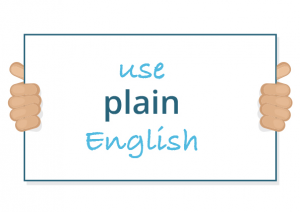 You have something to say? So, why confuse, annoy or alienate? This complete guide, with 16 tips on how to write clearly, will help you write so that everyone can easily understand you. Use plain English and decide exactly what you want to say.
You have something to say? So, why confuse, annoy or alienate? This complete guide, with 16 tips on how to write clearly, will help you write so that everyone can easily understand you. Use plain English and decide exactly what you want to say.
Contents
- 1 How to write clearly
- 2 Using plain English
- 3 Tips on how to write clearly
- 3.1 Needless words
- 3.2 Be positive
- 3.3 Use active verbs
- 3.4 Use concrete words
- 3.5 Use bite-size sentences
- 3.6 Avoid making nouns into verbs
- 3.7 Choose short Anglo-Saxon words
- 3.8 Use indicative verbs
- 3.9 Convert numbers into pictures
- 3.10 Be specific
- 3.11 Personalise
- 3.12 Tell a story
- 3.13 Snapshot sentences
- 3.14 Steer clear of acronyms
- 3.15 Drop the clichés
- 3.16 Avoid weasel words
- 4 And remember, keep it simple
- 5 And finally…
- 6 Some examples you might like to read
Using plain English
First, ask yourself who your readers are. Know your audience. In other words, put yourself in their shoes and choose your words carefully. Be direct and speak precisely with words they can grasp. If they cannot understand you, why should they listen?
- choose your words deliberately
- craft your sentences carefully
- use grammar correctly
Use simple, everyday words. Avoid complex ones. Call a spade a spade, not a “digging implement”, and certainly not an “excavation solution”.

If you can take advantage of a popular expression to illustrate a point, do it. Keep your sentences short. Don’t use jargon. If you’re forced to use a technical term, explain what it means.
Remember any fool can make an idea sound complicated; it takes rigorous and careful thought to keep it simple.
Plain English communicates words clearly. It is universal, direct and concise. Furthermore, it creates a better impression on the reader or listener. And so, you and your project will appear friendly and helpful.
Writing in plain English is professional. You are not dumbing down the message and you are not talking down to your audience.
Look out for new words and interesting phrases. Put colour into your conversation. It’s exciting to learn and remember new vocabulary.
However, use words that are familiar to you and your audience. Trying to use vocabulary that you’re uncomfortable with could lead to some embarrassing mistakes. Furthermore, if you are using very complicated language, your audience might not understand you.
Read books and increase your vocabulary to help you write clearly.
Tips on how to write clearly
Here are 16 tips on how to write clearly. My complete guide.
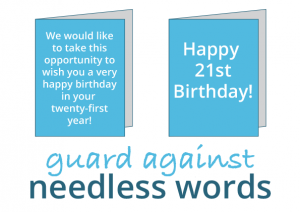
Needless words
Be on the guard against needless words. Be succinct and discard redundant words. “Our Company is facing up to the threat of being closed” can be simplified to read “Our Company faces closure.”
Avoid linking two words with the same meaning when one will do the job. So, do you really need to speak of “component parts”? “Free gifts”? Aren’t all gifts free? Watch out for anything that is “exactly the same”.
Similarly, avoid oxymorons which pair words that contradict each other: “new and improved”, “poor little rich girl”. It’s enough to confuse the “living dead”!
Be positive
Don’t be negative. Leave your audience with a clear picture of what you want to say. See how the word ‘not’ gives the very message you want to avoid. Tell your children “not” to cross the road, and what do they do? Why give them ideas you never intended them to have?
Use active verbs
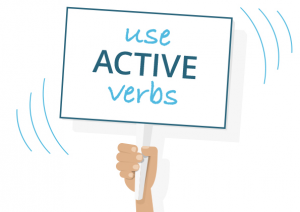 Use active verbs, rather than passive ones. In the active voice, the focus is on the subject, who performs the action of the verb. “The Council will meet next Thursday” is more lively and to the point than the weaker and stuffy passive voice, “A meeting will be held by the Council next Thursday”.
Use active verbs, rather than passive ones. In the active voice, the focus is on the subject, who performs the action of the verb. “The Council will meet next Thursday” is more lively and to the point than the weaker and stuffy passive voice, “A meeting will be held by the Council next Thursday”.
However, on occasions the passive voice has its uses. For instance, it can soften your message. It’s more tactful to say, “Your bill hasn’t been paid” rather than the direct “You haven’t paid your bill.”
Use concrete words
Concrete words represent objects that we can see, hear, taste, smell, or touch. Words like house, car, cake, flower and feather are all examples of concrete words. It’s easy to grasp an idea if it’s tangible and you can picture it in your mind.
Avoid abstract words, whenever you can. That’s because they tend to be vague. Abstract words communicate important thoughts in our speech and writing, but they can be tricky because they have many meanings. For example, abstract words such as chauvinism, freedom or morality may convey different things to different people and in different contexts.
Take the word ‘bad’ for instance. Someone tells you that the food is bad. It could mean it isn’t very tasty, could endanger your health or is decomposed. Why not be more specific? Use concrete words and admit the food is tasteless, germ-ridden, or rotten.
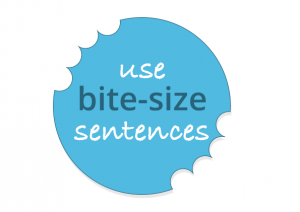
Use bite-size sentences
In general keep your sentences simple and short. Avoid too many sub clauses. Long-winded and complicated sentences can easily be misunderstood. So, try to use no more than twenty words in each. “Good writers should aim to be punchy.” Or, to be more concise, “Be punchy.”
Avoid making nouns into verbs
Beware of making nouns into verbs or vice versa. Has Jack Smith ‘authored’ a book? No, Jack ‘wrote’ a book. Or, was Rachel Jones ‘guested’ to speak at the Climate Change Conference? No, Rachel was ‘invited’ to give a speech.
Such Americanisms are becoming more common in English usage. Some are more welcome. I think we must thank the Americans for introducing words like ‘babysitter’ and ‘teenager’. The Peanuts cartoonist, Charles Schultz, popularised and may have coined the words “security blanket”.
Choose short Anglo-Saxon words
Most of our English words originate from the early Anglo-Saxon settlers. Later the Normans brought us their Latin-based language in 1066. Thanks to our invaders, we often have two words with exactly the same meaning. While Latin words tend to be long and cumbersome, Anglo-Saxon words are short and concise. For instance, to ‘perambulate’ is to ‘walk’. Why not go for the snappy option?
So remember, it’s ‘£5 a head’, not ‘per capita’ – unless, of course, your sole aim is to demonstrate you’re a person of ‘pretension, virtuosity and verbosity’. Oh dear, three more clumsy Latin nouns!
Use indicative verbs
Be factual. Use the indicative mood, that is verbs which express a statement of fact. For instance, ‘He’s the richest man in town’.
Try to avoid the vaguer subjunctive mood. This expresses ideas that are imagined, wished or possible and include a suggestion, command, or condition that may be contrary to fact. ‘If I were a rich man …’ is subjunctive.
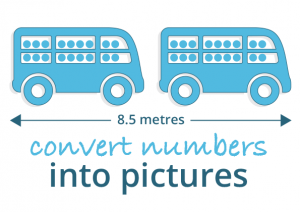
Convert numbers into pictures
Try to make numbers easy to visualise. Round off figures. 198 is nearly 200. Also, you can convert numbers to pictures. For instance, 8.5 metres is the length of two buses. Or, an audience of 112 – enough people to fill two double-decker busses.
By the way, “three times greater than” is the same as “four times as great as”. Yes, really! Know what you are saying.
Be specific
Be specific and precise if you possibly can. For instance, don’t generalise about American people simply based on a two-day stopover in Chicago.
Of course, there are times when you can’t be specific. All the tips I’ve listed on this page are generalisations. But for each I have added particular examples or images to make the tips easier to understand. As such, they become more meaningful. Good examples illustrate and make clear what you are saying.
Personalise
 People like to know about people. So, if you can make your point from a human interest angle, it’s more likely to be read. Your own experiences can add authenticity and authority.
People like to know about people. So, if you can make your point from a human interest angle, it’s more likely to be read. Your own experiences can add authenticity and authority.
You can often make a big story bigger by giving it a human face. For instance, the politician advocating a policy may be more interesting than the policy itself.
Tell a story
Journalists know the value of a good story. That’s because it has a momentum of its own and you can simply state what happened in its chronological order. Look for one that illustrates the point that you want to make. Illustrate rather than explain. A good story connects you with your audience. You can use your story to inspire or persuade.
Take time to read some of the classical story tellers. For instance Dorothy L Sayers, famous for creating the aristocratic sleuth, Lord Peter Wimsey, or George Orwell, author of Animal Farm and 1984.
Snapshot sentences
As with concrete words, good imagery evokes the five senses. Construct your sentence to stir up these senses in your reader’s mind.
Which of these two sentences paints a richer picture? ‘The boy pushed the wheelbarrow up the hill” or ‘The young boy struggled to push the heavy wheelbarrow up the hill”.
Put another way, the songwriter Dixon DeVore said: “Paint pictures with your words. And never, never, put down the brush.”
Steer clear of acronyms
 Acronyms are a shorthand that uses the first letter of each word in a phrase or series of words. For instance, ATM stands for Automatic Teller Machine.
Acronyms are a shorthand that uses the first letter of each word in a phrase or series of words. For instance, ATM stands for Automatic Teller Machine.
But, acronyms can confuse. Is a PC a personal computer or a police constable? Does AA stand for Automobile Association or Alcoholics Anonymous?
So, to avoid confusion, explain and spell out the full wording in your first reference. Then, use its short form thereafter.
Drop the clichés
Overused phrases, such as “at the end of the day”, have long since lost their usefulness and have become weak and meaningless. They add nothing to the message you are trying to convey and are simply padding. Moreover, they betray a lack of original thought. So, get rid of any worn-out ideas.
Of course, clichés were not always clichés. Once upon a time, they were each fresh thoughts. So, like those writers of yesteryear, spend a few minutes to think creatively and come up with your own unique phrases.
Remember, it’s not “rocket science”. When you write “avoid clichés like the plague”. Oh! I’ve done it again. These persistent clichés can creep in almost unnoticed. So, be on the look out.
Avoid weasel words
Weasel words or phrases are placed at the start of a statement to make it sound more truthful or meaningful. But this fails because the words lack the reliable evidence to back it up.
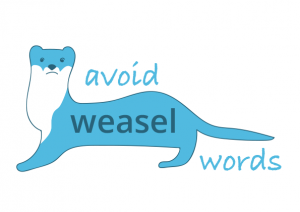 Sentences which begin “Experts believe…” or “Research shows …” may appear authoritative at the first glance. However, at best, these phrases are ambiguous and vague. At worst, they’re intended to mislead.
Sentences which begin “Experts believe…” or “Research shows …” may appear authoritative at the first glance. However, at best, these phrases are ambiguous and vague. At worst, they’re intended to mislead.
Weasel words betray lazy thinking. In today’s data-driven society, you need to be more precise. For instance, “Many people believe the world is flat.” But who are they? And precisely how many people say so?
To be truly persuasive, name a specific person or source to whom the statement or opinion can be attributed. Then, your readers can make up their own minds. Fortunately, weasel words are easy to spot.
And remember, keep it simple
- “Those who do not have pecuniary assets cannot have many options.” Put simply it means: “Beggars can’t be choosers!”
- “Having been injured by clenched incisors, the victim is thereafter cautious.” Why not say: “Once bitten, twice shy!”
Keep these tips in mind and you will be able to write clearly. Furthermore, you’ll stand a better chance of being understood and your message will be easily remembered.
And finally…
…get someone to proofread your work. You may have sweated blood researching the content of your work. But you may be too close to what you’ve written to spot your own gobbledegook or long-windedness.
Don’t get too emotionally attached to it. Be prepared to hand it over for editing before it reaches your readers.
If you have a few minutes, read this article again and let me know how you could improve it. I’m still learning to mind my language too!
Some examples you might like to read
- You can take a look at the biographies I’ve written on my personal website.
- If you want to publicise your work, take a look at Writing a press release.
- I’ve written a definitive essay on news values for journalists. This gives you more ideas on how to reach your audience and help you to communicate more effectively.
